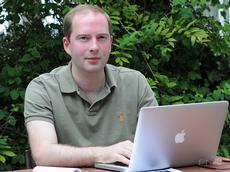Starter grant from Grand Challenges Explorations
ETH-Zurich postdoctoral fellow Bogdan Mateescu has done it: he is to receive a six-figure grant from Grand Challenges Explorations, an initiative funded by the Bill & Melinda Gates Foundation, which he wants to use to investigate why breast milk contains microRNA.

Bogdan Mateescu has done it: his application has just come through. He has been granted 100,000 US dollars for an 18-month research project, which he can get started on straight away. The money comes from the Bill & Melinda Gates Foundation’s Grand Challenges Explorations initiative, which funds new, unorthodox ideas make a break-through.
And Dr Mateescu’s idea certainly is unorthodox. Breast milk, says the Frenchman, who has only been working at ETH Zurich for a year, consists of different components, including well-known constituents such as various milk proteins, tiny vesicles that contain milk fat globules, lactose, vitamins and antibodies that protect the newborn against germs.
However, researchers have also found special molecules called “microRNAs” in the milk. RNA is produced when genes are transcribed. The cell uses this so-called messenger RNA (mRNA) to build proteins. MicroRNAs, which belong to the broader “small RNA” family, do not encode proteins, however. They are generated in sequential cleavage steps of longer precursor RNAs and can bind to mRNAs exhibiting “complementary sequences”. Through this binding, microRNAs have the capacity to recruit “silencing machines” that inhibit mRNA translation or even result in their degradation. Consequently, they are regarded as major regulators of cellular metabolism and differentiation. In mammalian cells, more than 800 different types of microRNAs are known.
It is generally thought that, like mRNAs,
small RNA fragments are confined within the cell. However, researchers from
world-renowned small RNA-specialist Professor Olivier Voinnet’s laboratory
demonstrated that, in plants, small RNA molecules move from cell to cell,
transmitting information as they go. This means they have a specific function
beyond cell boundaries. “There is now mounting evidence that this mechanism
also exists in mammals, but whether it plays a physiological role remains a
mystery,” says Dr Mateescu.
Are milk microRNAs essential?
In mammals, according to his hypothesis, “milk microRNAs” secreted from cells of the female’s mammary glands may perform their functions in newborns after ingestion. However, exactly what these molecules do where and how largely remains unknown.
“All that is clear at present is that the abundance and nature of microRNAs present in milk is compatible with potential physiological effects within the gastrointestinal tract of mammalian newborns,” says Dr Mateescu.
He therefore intends to use his grant to find out what effect, if at all, microRNAs have on the newborn by testing the milk’s ability to transfer microRNAs into intestinal cells using cell cultures and animals models, especially mice. This set of experiments will form the basis for subsequent clinical studies in humans. The ETH-Zurich researcher would also like to find out whether specific microRNA molecules might be useful or even indispensable for the newborn and whether it might therefore be beneficial to enrich powdered milk with bioactive microRNAs. Could these microRNAs even provide immunity against pathogens?
“This
could be significant in guaranteeing the healthy development of small children,
especially in developing countries. However, the question remains as to when,
where and how microRNA molecules affect the newborn’s intestines. Dr Mateescu
believes that “milk microRNAs” may perform their function shortly after birth,
while the potential effect in the later stages of development and adulthood is
less likely with the development of the full digestion capacities.
Proof of concept required
Dr Mateescu is confident that he will find the answers to his questions within the next 12 months – and, above all, lead the way into the future. After all, in Phase 2 of the grant process a million dollars from the foundation is potentially available to those who can demonstrate that their research is successful and promising in Phase 1. “I am more interested in the proof of concept for the time being”. If his hypotheses are correct, he can apply for a larger grant for Phase 2 before the end of Phase 1.
Dr Mateescu is a postdoctoral fellow in the new group headed by Professor Voinnet. He has found a phenomenal research environment here: well-equipped laboratories, international staff and above research freedom, which he would not have had if he had remained in France, where he completed his studies and doctoral thesis at the Institut Pasteur in Paris. His interest in microRNAs in human health is not new: it was also the object of his initial post-doctoral research at the Institut Curie (Paris). At the time, he published a study describing how the interaction between certain microRNAs and oxidative stress could affect the chemosensitivity and clinical outcome of human ovarian cancers.
Risks and new opportunities
Today, he lives in Zurich with his family and does not regret this change of location in the slightest. “To me, the grant means both the freedom to develop my own project and a step towards independent project management and implementation.” His supervisor, Professor Voinnet, encouraged him from the outset. Joining ETH Zurich, he was also aware of the risks. “I could have stayed in France and applied for a permanent position as a researcher, but I was lacking international experience and ETH Zurich and especially Professor Voinnet’s group seemed the best place to develop this project,” he says. Zurich was also a good choice for family reasons.
Second grantee of ETH Zurich
Receiving a grant from the Bill & Melinda Gates Foundation is no easy task. So far, only half a dozen researchers based in Switzerland have received one, including ETH-Zurich Professor Wolf-Dietrich Hardt. The foundation is based in Seattle and has now launched Round 9. Grand Challenges Explorations supports all novel research ideas – regardless of where the applicant is from – with the aim of using them for the good of humankind, especially in developing countries.







READER COMMENTS